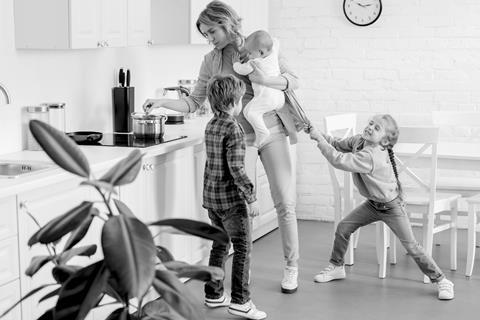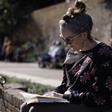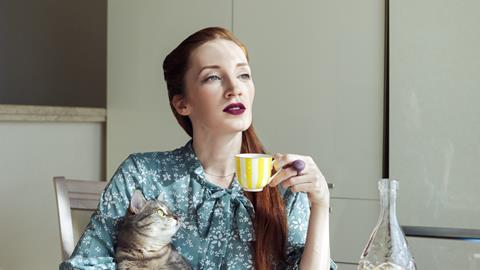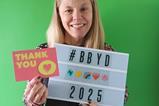With a recent survey revealing more women are deciding not to have children, Alex Noel looks at the Church’s attitude in response
In the months running up to November’s US election, women have been getting a lot of airtime; especially women without children. As Donald Trump, Kamala Harris and their respective running mates JD Vance and Tim Walz have jostled for position, people have been noticing their attitudes towards women.
When JD Vance’s comments from a 2021 interview resurfaced, the backlash was quick. According to him, the US was being run by “a bunch of childless cat ladies who are miserable at their own lives and the choices that they’ve made”. This political slur touched a nerve, highlighting how negatively women without children are perceived.
Consequently, ‘childless’ women (and their cats) are having a cultural moment. It peaked when one of the biggest pop stars in the world signed her political endorsement: ‘Taylor Swift, Childless Cat Lady’, flipping that notorious label into something much more ironic…and cool.
Childless or childfree?
Which term you identify with is largely determined by whether not having children is voluntary. While being ‘childless’ conveys deficiency (whether felt or assumed), being ‘childfree’ is more expansive, empowered; a woman has chosen not to have children. But how many actually make that choice? Aren’t women more likely to find themselves without children because they are single, ‘haven’t met the right person yet’ or due to infertility or baby loss?
Many believe that the Creation mandate still stands as one of the defining principles of Christianity
In fact, the first ever ‘UK Generations and Gender Survey’ uncovered a growing trend of women choosing not to have children when it set out to discover why the UK birth rate had fallen from 2.4 children to 1.5 children (per woman). Published in January by the University of Southampton, in cooperation with the international ‘Generations and Gender Programme’, it collected data “on partnerships, marriages, and fertility histories from a representative sample of 7,000 people aged 18-59 in the UK”. Among its findings: less than half of 25-34-year-olds intended to have a child, and a third of 25-41-year-olds said “definitely not”.
However, even with this shift, a recent Times article noted that ‘childfree’ women are still stigmatised: “regarded as being less likeable, loving, devoted and emotionally mature than women with two children…[and] often viewed as selfish, self-centred and materialistic after disclosure.” One Bristol psychotherapist has even set up the first national therapy group for women who are ‘child-free by choice’, and hopes it will be seen as “a valid alternative life path, not a pathology that needs to be fixed”.
Real-life experiences
For Christians, the ‘Creation mandate’ of Genesis 1:28; “Be fruitful and increase in number, fill the earth and subdue it” looms large. While some theologians assert it was an instruction specifically for Adam and Eve, many believe that it still stands as one of the defining principles of Christianity.
I would probably call myself ‘childfree’, though I’m open to having children (and being married). I discussed this with editor Tola-Doll Fisher and fellow guest Denise Lee Yohn on the Woman Alive podcast episode ‘Called to be childfree’. Since then, I have spoken to several other Christian women about being childfree and what it means for them:
For Julia* having children was assumed by the ‘provincial’ culture she grew up in. Friends coupled up and married young; her female peers just couldn’t wait to start having babies: “I thought that I would work for a couple of years, find an amazing guy, get married when I was about 25, have three kids… [it was] what I’d seen modelled for me as I grew up in the Church.”
Similarly for Denise (Lee Yohn), it was the natural expectation: “I thought that I would be a mom, probably have two kids. I thought I would work, as well as have a family.”
Megan recalls participating in typical schoolyard chatter: “When you’re a little girl everybody says, ‘oh what would you name your children?’ I definitely took part in that.”
As a young woman, Denise was looking for examples of the life she envisioned: “I really only had two good role models.” One was her hardworking mother – “she really worked herself down to the bone”. The other was her older sister, whose early career success meant she could easily afford a full-time nanny. It was different for Denise and husband, Chris: “I didn’t feel [those] were viable for us. So I was struggling with [the question]: ‘How are we going to do this?’”. As a couple, they were enjoying their lives just as they were: “we were very clear-eyed that if we were going to have kids, all of that would change”.
Even so, they remained open to having children: “We prayed, ‘Lord, please make it known to us if this is what you want’ and he just never did…we would check in with each other regularly about the decision, and neither one of us felt like we were called to it.” Giving serious thought to her capacity, and having self-awareness was key too: “I felt like God didn’t wire me to be more committed to my children [than to my career]…my temperament, my personality, my values were so much more oriented towards the workplace.”
I know men in their 50s who are still looking for that girl who’s 28 because they want to have kids
It’s something Julia recognises: “I’ve worked with a lot of people who have had children but [they] haven’t been their priority. And the children know that.” When she got married at 40 she had already decided not to have children, aware of the risks of trying to have a natural birth in her 40s. It wasn’t the only thing that influenced her: “My best friend got surprisingly pregnant when we were 21. So, I never had any illusions as to how hard it is to raise kids…I thought: ‘Do I want to do this 24/7?’” She feels fortunate to have met a man who shares her outlook: “As soon as I hit [my early 30s] I was no longer an option for the guys in my church…I know men in their 50s who are still looking for that girl who’s 28 because they want to have kids.”
“[I’ve] never actually had a great desire for children”, says Megan. But that’s not to say she doesn’t like them. She enjoys being the ‘fun aunt’ and has considered adopting. In lots of ways the absence of children personally doesn’t mean there aren’t children in your life. As a teacher, Julia laughs at the irony of calling herself childfree: “Childfree! I’m not childfree, I see 200 children every day!”
In contrast, Clare* is ‘childless not by choice’ but wants to understand the childfree perspective. Now in her 50s, she finds that people assume any children she has are teenagers or older: “so they kindly inquire [about them], only to find that I don’t [any]. That’s when they go, ‘Oh, great choice’. If I replied, ‘actually, it wasn’t my choice’, that would be such a downer, wouldn’t it?” She chose not to have IVF because it didn’t feel right for her. But not having children: “never was my choice, although you might argue otherwise.” The term ‘childfree’ jars a bit, “[it] seems to be quite a progressive thing to say, ‘Oh, you’ve chosen not to have children, that’s really rad’…it’s just a more upbeat thing than saying, ‘Oh, [that’s] sad’ or whatever.”
Enquiries about children made Denise pull back from her father’s family (who live geographically closer than her mother’s): “in the Chinese culture, it’s very common for people just to say [exactly what they are thinking]…I just didn’t want to deal with those questions.”
Julia concurs: “It’s not really anyone’s business…this is a really personal part of me that is very public.” She’s experienced judgement for investing in her career but asserts: “I’m not going to mope at home because my dream life when I was 21 didn’t work out.”

Pressures and assumptions in the faith community
Those dreams are often shaped by a very prevalent Christian ideal: “You’ve got to be the 2.4 children, white picket fence, car, nice garden, good job [etc]” says Megan. “There’s still a lot of unwritten expectations of women…Christian society [especially] makes it a big thing….to properly be a woman you must have children. But for me it’s just never been a thing…I think it’s something I’ve fought against every step of the journey of being a churchgoer, Jesus-follower, Christian – whatever phrase you want to use.”
Julia agrees. She never rested her hopes for happiness or sense of identity on having children: “I don’t believe that the only way to be a Christian woman is to be a wife and mother.” She feels that focus translates into churches becoming “unwelcoming places…not only [for people] who don’t have children, but who are not married…wealthy…heteronormative. It saddens me [that] people should be ‘normal’ in a certain way [to be] accepted.”
Those with marginal experiences are often forced to reckon with what ‘normal’ is, and especially of what it means to ‘fit in’. The choice not to have children inherently questions the idea of how women are valued, as well as confronting a picture-perfect vision of family. Put on a pedestal, it excludes far more people than it includes.
In churches, it’s quite usual to group people together by ‘age and stage’. Denise feels that by “separating people based on demographics…women’s ministry, men’s ministry, young adults, kids, youth, whatever”, there is no “natural place” for women who don’t have children.
She has needed to adapt: “My husband and I haven’t belonged, and so we’ve had to deliberately adjust our expectations for friendships – both who we were going to be friends with, and what those friendships would look like.” But she is able to spend more time with friends, mentors and mentees, and has “a lot more bandwidth to do lots of different work”.
Are married people with kids prioritised in Church? “Oh yes, absolutely,” says Megan. She saw this happening in a large church she worked for: “There was…singleness, then you’ve got to be married and then you have children. It was modelled in all the different small groups [and] ‘if we don’t know where to stick you… you’re a bit odd’”. But she recognises “if you’re taking it from an organisational point of view it makes sense”. However, are churches organisations or are we the body of Christ?
The absence of children personally doesn’t mean there aren’t children in your life
Clare has also observed this: “If you’re not married [or] you haven’t had kids…you somehow fall between the cracks of what churches are about.” And so, with many of the well-worn pathways in churches for those who are married with children, these women find themselves having to chart their own path.
Megan reflects that: “the Church struggles with anything that’s slightly messy or nuanced”. She has identified a mindset among leaders of: “this is the way we’ve always done it”, which limits their ability to think outside the box when it’s required. What could it look like to build the Church around a different ideal?
For Denise language is key, and she has tried to push back on the idea that to be a family necessitate having kids: “Chris and I are a family; we just don’t have children.” She also recommends seeing parenthood as a calling like any other, and believes “not everyone is called to it”. She also says differences within the Church are a good thing: “the Church benefits when there’s more diversity [and] differentiation within its ranks.”
Women being able to choose to have children or not is a relatively recent phenomenon. As one friend, who has children, commented: “When there’s no longer an option, there’s no longer a choice”, so having the choice at all feels like a privilege. The fact I don’t have children has at times felt like wasted potential. But I have ‘wasted’ many potentials: in theory I could have been a concert pianist, a pop singer, a dancer…a butcher, a baker, a candlestick maker. We all carry potentials within us, but it’s the choices we make in the circumstances we find ourselves in that determine what we will become – and how we respond to the call of God on our lives.
*Real names have not been used in order to preserve privacy.
Listen to the Woman Alive podcast episode, ‘Called to be childfree’ on Premier.plus, Apple Podcasts or Spotify.

































No comments yet